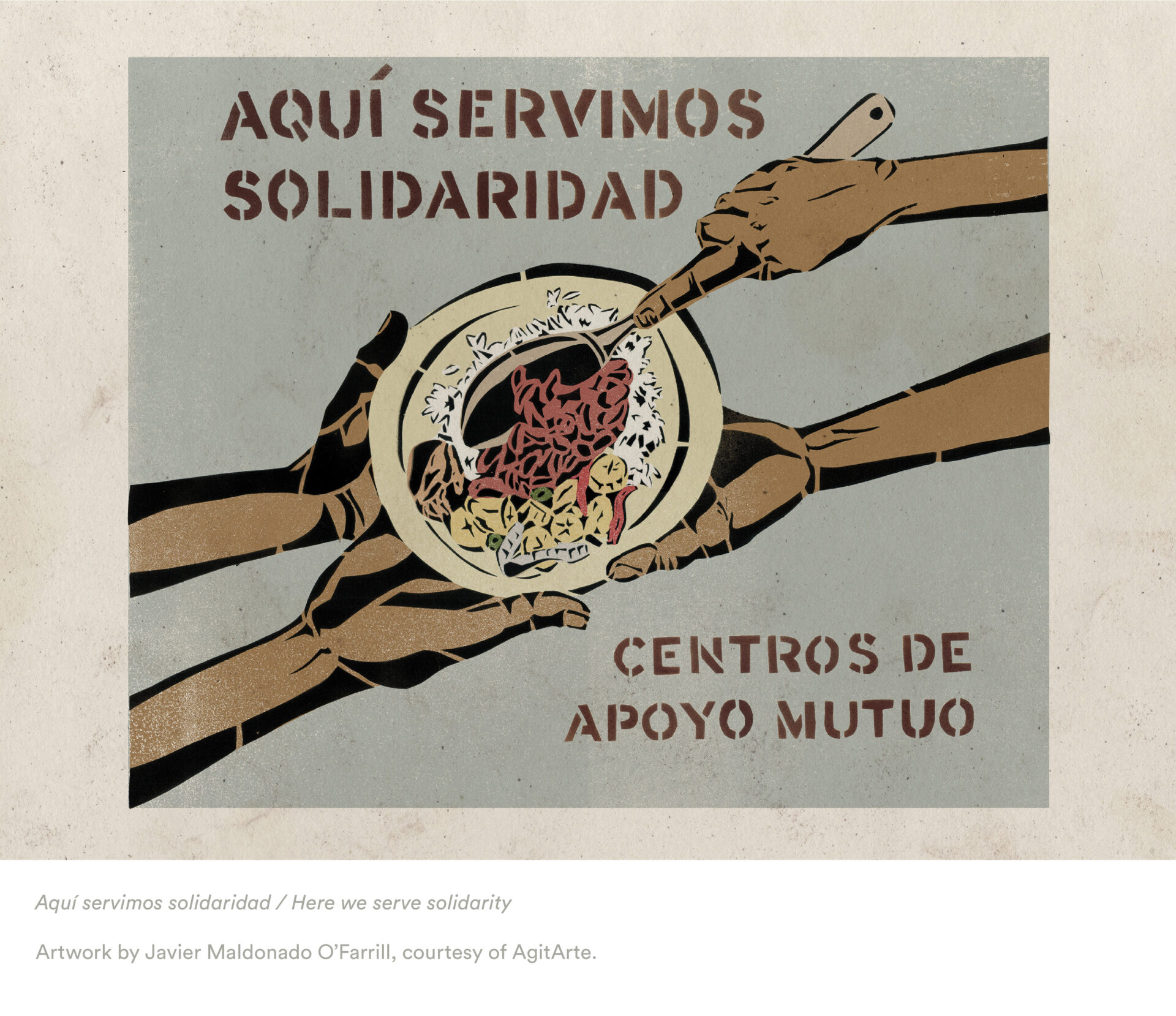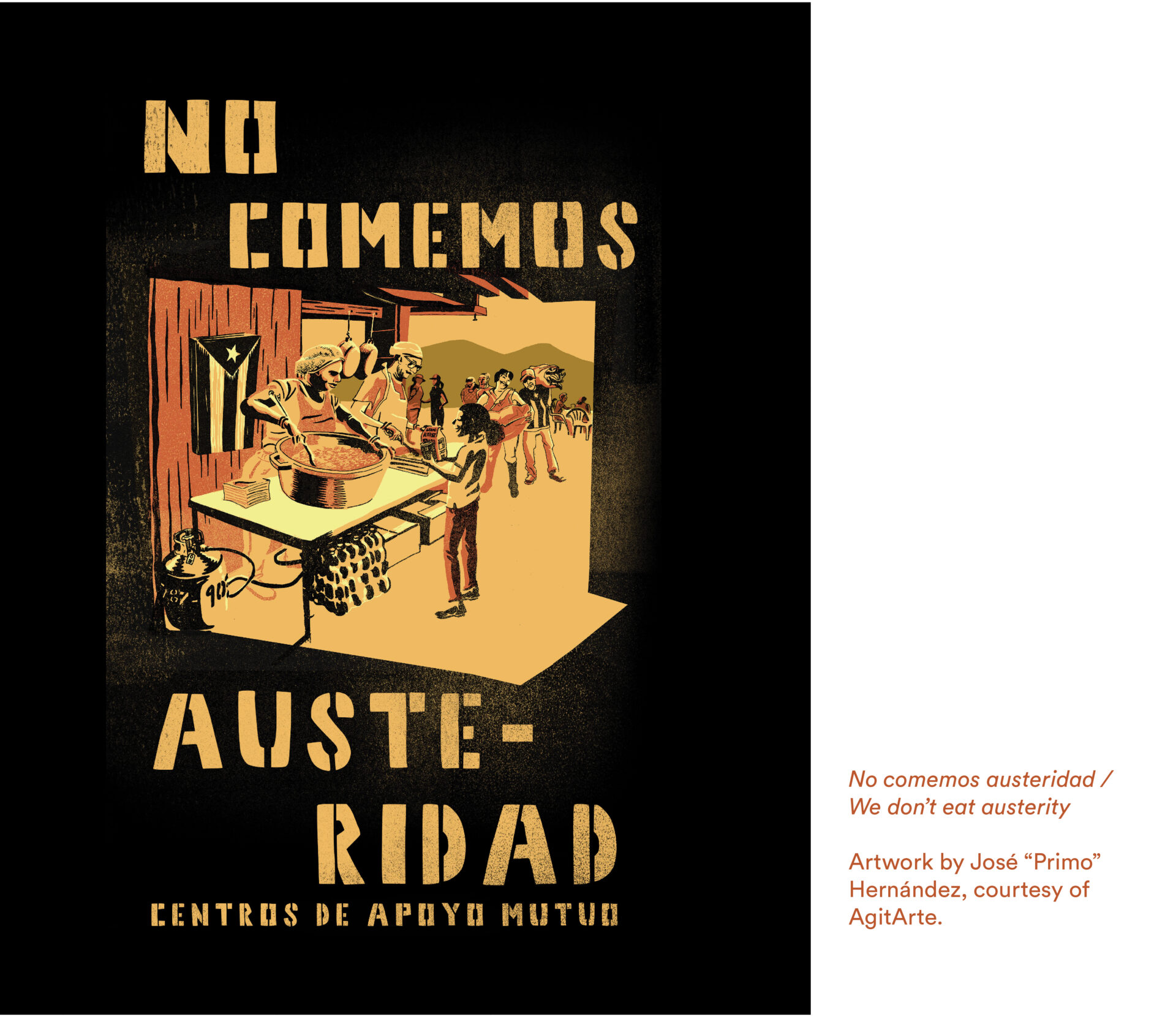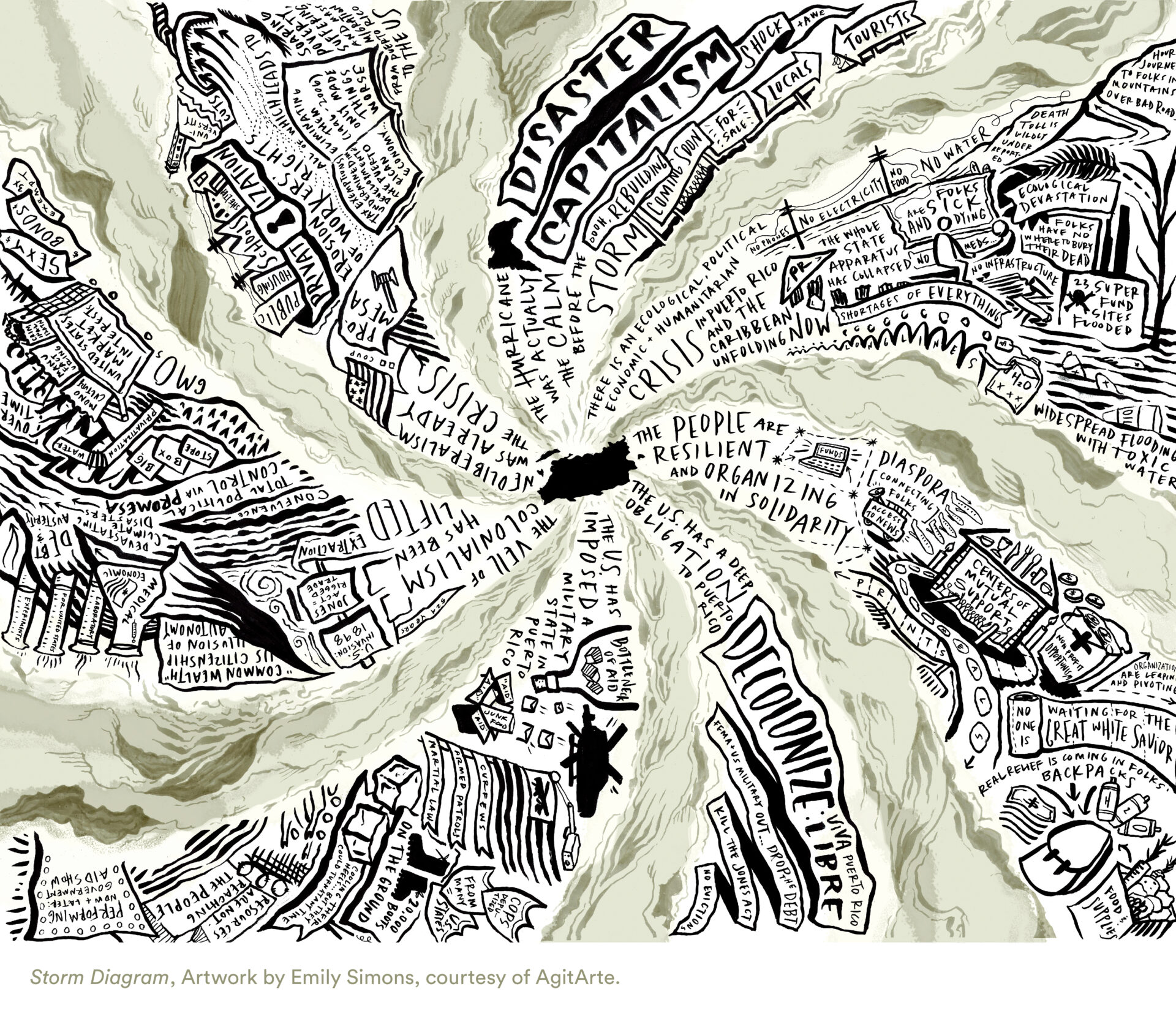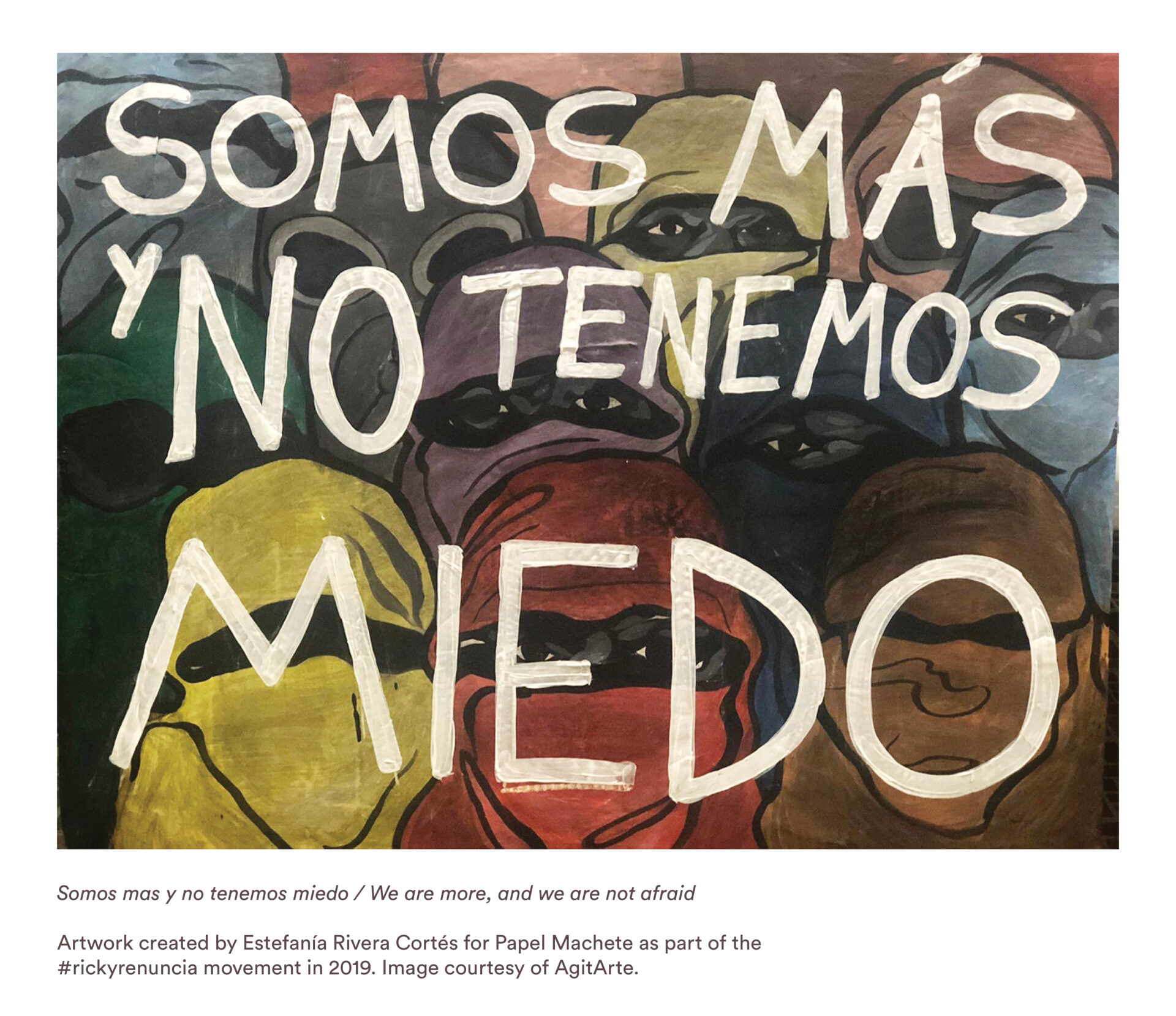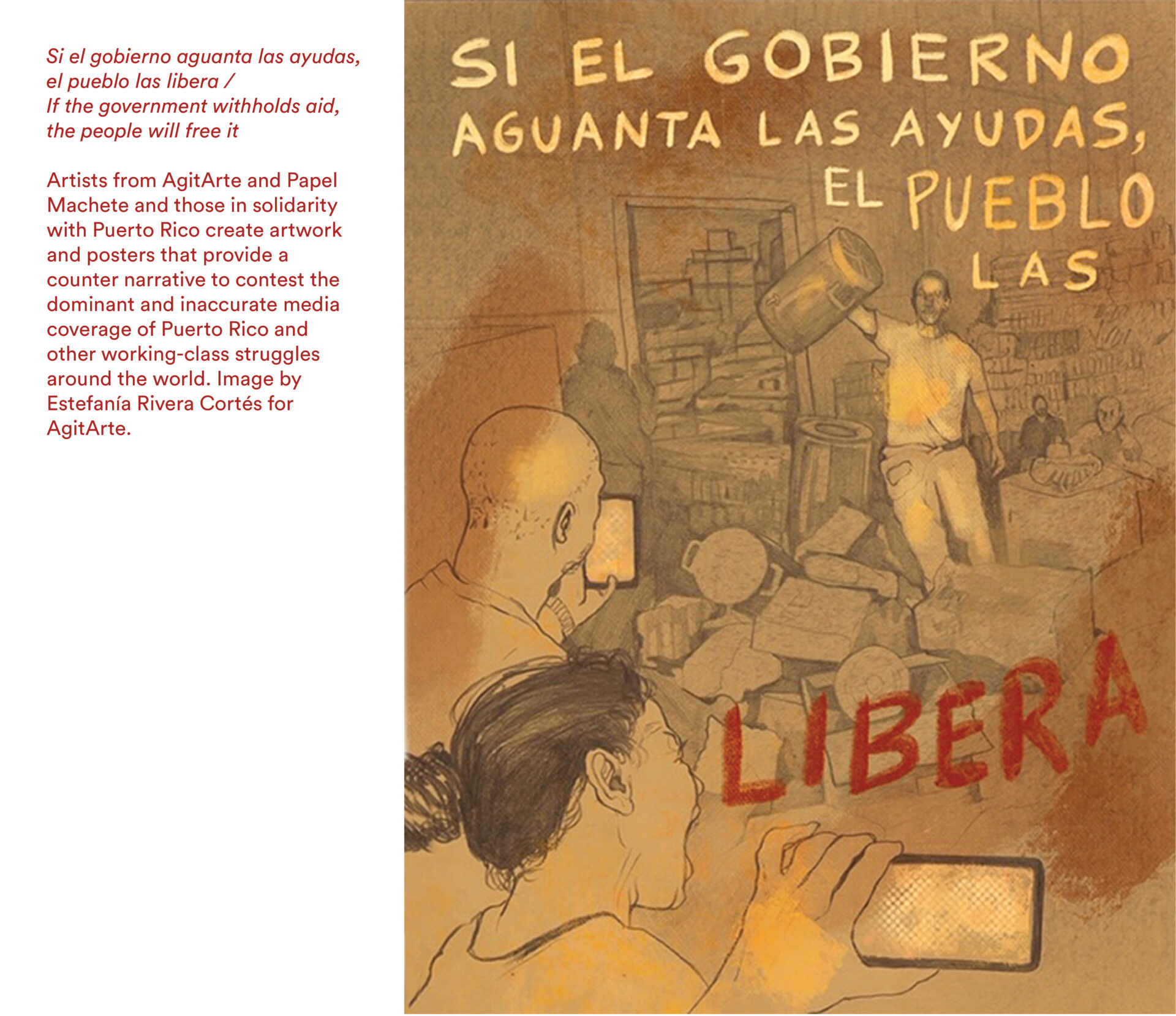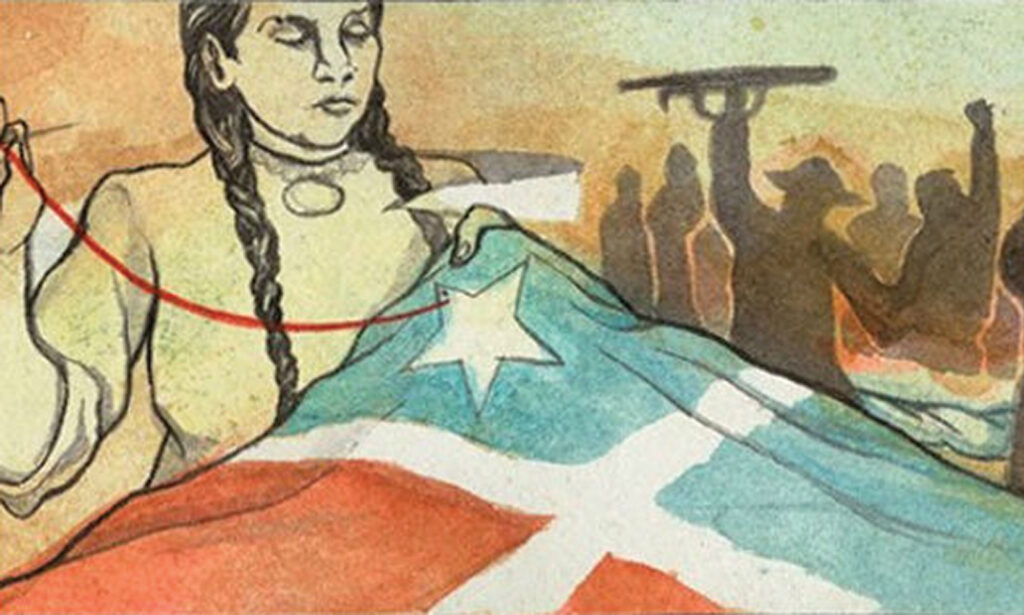
End the Debt! Decolonize! Liberate Puerto Rico!, a hand-illustrated scroll over 170 feet long and 3 inches wide created by artists from AgitArte and Papel Machete, in collaboration with Estefanía Rivera, Crystal Clarity, Rachel Schragis, and Emily Simons. All rights reserved, AgitArte.
Since December 28, 2019, hundreds of earthquakes have hit Puerto Rico, which is still recovering from damage caused by Hurricane María in 2017. Three weeks after the first earthquakes, on January 18, 2020, a social media independent reporter was tipped off to a warehouse in Ponce, a city south of the main island of Puerto Rico, where aid had been withheld since recovery efforts post-María.
So when the reporter, El Leon Fiscalizador (The Auditor Lion), announced the existence of a government-managed warehouse full of aid, dozens of people started arriving at the scene. Thousands watched the live feed on Facebook in complete disbelief of the revelation that there was all of this undistributed aid in the middle of an ongoing seismic disaster two and a half years after the aid was supposed to have been distributed. People kept arriving and eventually held an assembly to decide whether or not they would open the warehouse and release the much needed aid. The decision was made to distribute the aid to the hundreds of people who had now gathered desperately seeking supplies.
Over the next couple of days new protests were called, as the people of Puerto Rico were infuriated by the government’s slow and inadequate response to yet another ongoing disaster. It was a repetition of the corruption and incompetence of the federal and local governments that became clear after Hurricane María and was aggravated by the neoliberal colonial mechanisms imposed on our islands, as exemplified by the Fiscal Control Board, that benefit private corporations and the political and financial elite at the expense of the Puerto Rican people.
______
Back in 2017, I was in Chicago launching the When We Fight, We Win! Arts and Culture Tour, which culminated in the painting of a mural in Chicago celebrating the release of Puerto Rican political prisoner, Oscar López Rivera. The mural was a collaboration between the Puerto Rican Cultural Center and AgitArte, our organization of working class artists engaged in intersectional cultural solidarity and mutual aid projects in the United States and Puerto Rico.
In Puerto Rico, AgitArte was developing the networks and relationships to train folks who were doing frontline work against the austerity and privatization imposed by the fiscal control board. This oversight body was created by PROMESA [the Puerto Rico Oversight, Management, and Economic Stability Act] in 2016 and comprised of seven officials, appointed by the U.S. President, who have power over the Puerto Rican economy to pay back Puerto Rico’s onerous debt.
Jornada Se Acabaron las Promesas, a diverse group of frontline militant activists, organized a series of very effective actions that culminated on August 31, 2016, when Jornada stopped the first PROMESA conference held in Condado, Puerto Rico. The success of direct actions energized the movement, and a training on techniques to be used on the streets was organized with Ruckus Society (a multi-racial network of trainers in direct action) the weekend before Hurricane María hit.
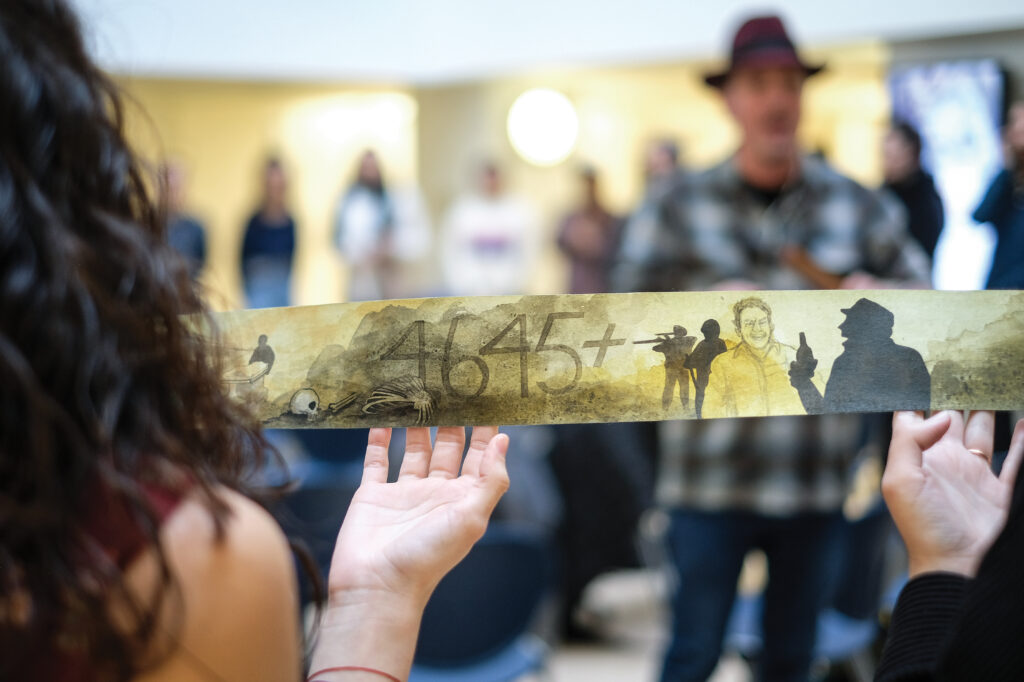
Section of End the Debt! Decolonize! Liberate Puerto Rico! depicting the staggering number of deaths caused by Hurricane María. Photo by Pablo Delano.
I got back to Puerto Rico on Friday, September 16th, and by the end of the weekend we received news of the unavoidable hit of Hurricane María’s path towards our islands. We didn’t have time to plan much, but we established two meeting points, the Federación de Maestros de Puerto Rico (Federation of Teachers), a very progressive and militant union in Puerto Rico, and Casa Taller Cangrejera, AgitArte’s community and cultural hub and artist workshop in Santurce. In Casa Taller we prepared over the next two days for the coming of the hurricane. We had over a dozen volunteers, and we housed a couple of families who were in unsafe houses.
Hurricane María was catastrophic. Everything and everyone was affected. We lost power and barely had working telephone service, and there was no running water on most of the islands. We started hearing about the increasing deaths throughout the island. Funeral homes were reporting that they could not keep up with the growing number of bodies arriving each day. The government collapsed and the lack of aid from federal authorities after Hurricane María opened up the possibility to build autonomous community initiatives of mutual support, and grassroots organizational structures emerged based on cooperation and solidarity. We knew very little at the time of the immense devastation throughout the archipelago until we started brigades to bring aid to communities all over the island. We organized self-managed spaces around the main island known as Centros de Apoyo Mutuo (Mutual Support Centers or CAMs for short). In the CAMs, the following three main functions were:
• Establishing community kitchens and dining rooms where free meals were prepared and served
• Organizing collection centers where local and diaspora aid was collected for distribution in the communities according to needs assessed during visits to peoples’ homes
• Forming permanent solidarity brigades to open roads and access to homes and support in agriculture and housing reconstruction
Public spaces formed as CAMs brought much needed food and supplies to communities which were totally abandoned by the state. These critical community spaces were initiated by organizers, activists, and community members who worked together for years as part of an extended community of teachers, social workers, students, lawyers, and artists in frontline struggles against privatization and the US-imposed Fiscal Control Board.
People from all over Puerto Rico came to Casa Taller Cangrejera to check in and figure out how to start brigades. Our squad members in New Orleans and Boston initiated a fundraising campaign and sent a lot of aid to communities in Puerto Rico. The rapid distribution of aid and the creation of these Centros was possible due to the transnational relationships which had been built through years of working arm in arm with our kindred organizations and communities in the U.S. and in Puerto Rico.
At one point, there were 14 functioning CAMs throughout urban and rural areas of the main island of Puerto Rico’s archipelago. As the projects progressed, CAMs also offered the services of popular health clinics, cultural activities, community garden workshops, and educational projects for adults and children. In addition to providing support to overcome urgent needs in communities, we created discussion spaces to generate critical dialogue, and the understanding that we were facing a political disaster even more dangerous than the natural disaster.
We were facing a political disaster even more dangerous than the natural disaster.
AgitArte also initiated a theatrical and visual arts rapid response in communities and CAMs around the island. This resulted in posters like “Fuck FEMA and the US MIlitary, Release the Aid,” a middle finger in protest of the withholding of aid by federal authorities, and No comemos austeridad, “We don’t eat austerity,” a reminder that neoliberal politics have a daily effect on people’s ability to cover their basic needs. We also developed a cantastoria, a sung picture storytelling performance that showed and spoke of the catastrophe and disaster capitalism brought upon by the management after the natural disaster.
The highlight of our artistic projects in response to the Hurricane was the End the Debt! Decolonize! Liberate Puerto Rico! Scroll project, which tells a story of struggle and resistance to U.S. colonialism in Puerto Rico and its diaspora. The hand-illustrated scroll is over 170 feet long and 3 inches wide of continuous moving images, performed with an original song by the theater group Papel Machete. The visual art and performance piece was created by artists from AgitArte and Papel Machete, in collaboration with Estefanía Rivera, Crystal Clarity, Rachel Schragis, and Emily Simons. This project was also part of the When We Fight, We Win! Arts & Culture Tour. All of these projects were an integral part of the mutual aid work where artists organized to counter the government’s messaging of “normalization” on the island when people were still suffering.
______
The government has lost its credibility with the Puerto Rican people. This has been a growing sentiment towards a colonial and federal government, which has submitted people to extreme austerity measures while they—the political class and the powerful economic interests of Wall Street—continue to find new ways to extract any possible resource from our islands.
I still remember hearing U.S. General Richard Kim, in charge of the relief and military operations in Puerto Rico after the hurricane, state in an interview that they were going to have to open the ports up so bottled water could get to the supermarkets. In other words, they had to allow merchandise to get to the stores so people could continue buying those same necessities, which were sent for them as aid. He never spoke of actually releasing the immense amounts of aid—thousands of cargo containers containing basic necessities for survival—sitting in the same ports of entry awaiting inspections and distribution. It became clear that the concern of the colonial government and federal authorities were with the profit margins of U.S. corporations, and not the welfare of the people in need.
This is a metaphor for the whole management of the catastrophe. An opportunity for disaster capitalists to make money from the misery of the people of Puerto Rico through federal funds, energy contracts, food and water, which was paid for and never delivered; the shutting down of public schools; and the facilitation of the displacement of our people through policies like opportunity zones and community block grants.
The #rickyrenuncia movement in the summer of 2019 where hundreds of thousands of Puerto Ricans took to the streets, and through direct action and confrontation with the repressive forces of the state made then-governor Ricardo Rosselló step down, was the culmination of a process of rejecting the politics of disaster capitalism, and the total abandonment of the people by the state after María. Thousands of pages of chats between the governor and other government officials were revealed including homophobic comments and total disdain for the people of Puerto Rico; including mocking the dead after the hurricane. It felt like people were finally able to channel the pent-up rage of the abuses we have endured. Artists of all backgrounds and identities were front-and-center and instrumental in the shifting of consciousness throughout the islands in favor of the governors’ resignation. These were highlighted by visual arts, performances, and the popular dance party perreo combativo on the streets in one of the most important and intersectional movements of our times.
New challenges are faced now with a new governor who represents a continuation of the same politics of the preceding governor as proven by the crisis of unsafe schools after the earthquakes, the lack of aid to both hurricane and earthquake victims, and the normalization of the social and economic crisis we are living in. This is the reality that will continue to worsen if we continue to be governed by the Fiscal Control Board and treated as a colony of the United States, which has condemned us to serving the interests of the United States at the expense of the people of Puerto Rico.
Nonetheless the exercises of self-governance, or as we called them ejercicios de independencia, experienced in the CAMs and when people came together to oust an abusive colonial governor, are great examples of a transformation that’s possible when the material conditions and the will of the people come together. The fissures created after catastrophes in the management of emergencies by the state can create conditions for breaks in the hegemony of our colonial state and permit for new structures of governance and power. These are much needed exercises of autonomous action and organizing, which inform practices and ideas of future alternatives to the organization of the state and society.
Current and future possibilities for self-governance must be grounded in a culture of mutual solidarity to generate and nurture new and existing structures in society, engaging in a praxis of autonomous action and collective agency. As our people recover from numerous earthquakes and aftershocks, the network of mutual aid centers was once again ready to act immediately and meet the needs of their communities. Using a group chat created after Hurricane María, the CAMs have identified needs, located sources for aid and supplies, coordinated brigades and the distribution of aid, and communicated with the Puerto Rican diaspora with what and where to send support. This kind of rapid response and coordination would not have been possible without the network Red de Apoyo Mutuo (Network of Mutual Support) formed after María. Functioning from the lens of mutual aid and solidarity, the network is another living example that the Puerto Rican people are organized and, with proper resources and autonomy, the most equipped to support each other.
Jorge Díaz Ortiz co-founded AgitArte in 1997 and is an editor of the book When We Fight, We Win! He is a puppeteer, popular educator, and bicultural organizer with over 25 years of experience. He is deeply committed to working class struggles against oppressive systems, namely colonialism, patriarchy, white supremacy, and capitalism. Jorge is also a founding member of Papel Machete, a collective of radical artists and street theater/puppetry workers dedicated to education, agitation, and solidarity work in 21st century Puerto Rico and its diaspora. He received his BA in Mass Communication from Emerson College in Boston, Massachusetts. Jorge strives to be a rigorous, organic intellectual and is based in his hometown of Santurce, Puerto Rico. He and Papel Machete are 2020 A Blade of Grass Fellows for Socially Engaged Art.
